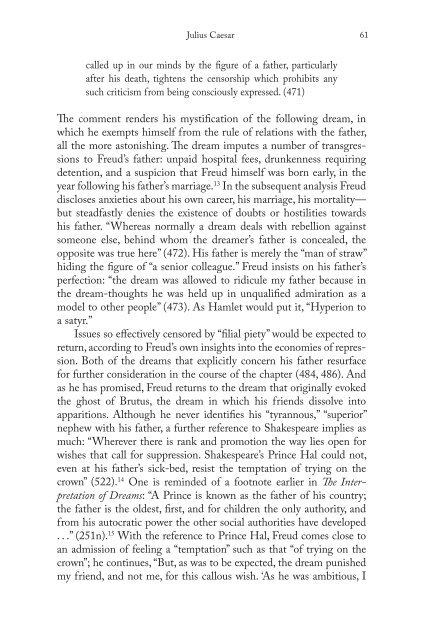Bloom's Literary Themes - ymerleksi - home
Bloom's Literary Themes - ymerleksi - home
Bloom's Literary Themes - ymerleksi - home
You also want an ePaper? Increase the reach of your titles
YUMPU automatically turns print PDFs into web optimized ePapers that Google loves.
Julius Caesar 61<br />
called up in our minds by the figure of a father, particularly<br />
after his death, tightens the censorship which prohibits any<br />
such criticism from being consciously expressed. (471)<br />
The comment renders his mystification of the following dream, in<br />
which he exempts himself from the rule of relations with the father,<br />
all the more astonishing. The dream imputes a number of transgressions<br />
to Freud’s father: unpaid hospital fees, drunkenness requiring<br />
detention, and a suspicion that Freud himself was born early, in the<br />
year following his father’s marriage. 13 In the subsequent analysis Freud<br />
discloses anxieties about his own career, his marriage, his mortality—<br />
but steadfastly denies the existence of doubts or hostilities towards<br />
his father. “Whereas normally a dream deals with rebellion against<br />
someone else, behind whom the dreamer’s father is concealed, the<br />
opposite was true here” (472). His father is merely the “man of straw”<br />
hiding the figure of “a senior colleague.” Freud insists on his father’s<br />
perfection: “the dream was allowed to ridicule my father because in<br />
the dream-thoughts he was held up in unqualified admiration as a<br />
model to other people” (473). As Hamlet would put it, “Hyperion to<br />
a satyr.”<br />
Issues so effectively censored by “filial piety” would be expected to<br />
return, according to Freud’s own insights into the economies of repression.<br />
Both of the dreams that explicitly concern his father resurface<br />
for further consideration in the course of the chapter (484, 486). And<br />
as he has promised, Freud returns to the dream that originally evoked<br />
the ghost of Brutus, the dream in which his friends dissolve into<br />
apparitions. Although he never identifies his “tyrannous,” “superior”<br />
nephew with his father, a further reference to Shakespeare implies as<br />
much: “Wherever there is rank and promotion the way lies open for<br />
wishes that call for suppression. Shakespeare’s Prince Hal could not,<br />
even at his father’s sick-bed, resist the temptation of trying on the<br />
crown” (522). 14 One is reminded of a footnote earlier in The Interpretation<br />
of Dreams: “A Prince is known as the father of his country;<br />
the father is the oldest, first, and for children the only authority, and<br />
from his autocratic power the other social authorities have developed<br />
. . .” (251n). 15 With the reference to Prince Hal, Freud comes close to<br />
an admission of feeling a “temptation” such as that “of trying on the<br />
crown”; he continues, “But, as was to be expected, the dream punished<br />
my friend, and not me, for this callous wish. ‘As he was ambitious, I
















